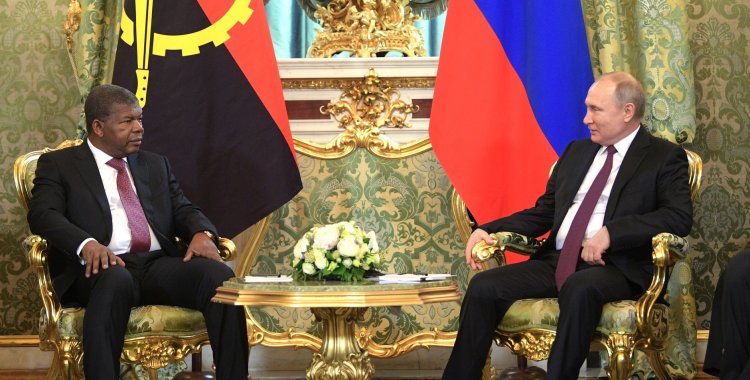The signing of agreements between Russia and the Portuguese-speaking African Countries (PALOP) practically dates back to the period of independence, but statements by the spokeswoman for the Ministry of Foreign Affairs, Maria Zakharova, last Wednesday, anticipate that multiply in the near future, predicts the coordinator of the SEDES Security and Defense Observatory, Major General João Vieira Borges.
"[When the spokesperson for the Russian MNE says that Portugal has had an] offensive stance in recent times towards Russia, and that we are at the lowest point in diplomatic relations between the two countries", it was the same as saying that "we are now in conditions to enter Portugal's space of influence, namely the PALOP", said the general, speaking to Lusa.
"I also interpreted that in that sense; it wasn't just [the outburst of] one Calimero, on the contrary, it was saying that 'Portugal is completely in the sphere of the West, namely under the influence of the United States and NATO and, therefore, became the to be a country that we [Russia] don't count on; and from then on we can do whatever we want, wherever it is'", he added.
As? Through the materialization of "other agreements with other Portuguese-speaking African countries", concluded Vieira Borges.
Moscow's next most expected targets for signing military agreements, according to the expert, will be Mozambique and Guinea-Bissau, since a recent rapprochement between Luanda and Washington has left Russia in a "state of alert", and Cape Verde is a traditional ally of the West.
Angola is, however, among all Portuguese-speaking African countries, the one that signed the most extensive and profound military and police cooperation plan with Moscow.
The cooperation plan attached to the military, technical-military and police cooperation agreement between Russia and Angola for the years 2014-2020 – whose individual programs only end when completed, and may extend beyond the plan's term of validity – arrives to foresee the construction of weapons factories with Russian patents on Angolan territory.
This program provided for the supply of weapons to the three branches of the Angolan armed forces, including combat, surveillance and training aircraft, missiles and other sensitive weapons to the Angolan air force; patrol ships for the navy or construction of an artillery factory and another for light weapons, modernization of armored vehicles, and provision of light weapons to the Angolan army and police.
On the other hand, Russia's "main African partner in space exploration has been Angola", after some cooperation projects with South Africa, such as the KONDOR-E satellite surveillance project of the 2010s, were "marked by distrust", according to a study by the Stockholm Center for Eastern European Studies (SCEEUS) from January 2024.
With Mozambique, Russia has signed several military agreements in recent years, one on mutual protection of classified information, in August 2019, and another on simplified procedures for the entry of Russian warships into Mozambican ports, in April 2018, followed by a memorandum of naval cooperation a year later.
They are all in place, but, according to international analysts, Moscow has been pursuing the dream of installing a naval base in the port of Nacala for years and was close to achieving it, following the hidden debts scandal in 2018.
Shortly afterwards, Moscow sent the Wagner paramilitary group to Mozambique to fight al-Shabab in Cabo Delgado, in a short-lived operation, which resulted in a failure by the Russian mercenaries.
"Moscow is undoubtedly eyeing the port of Nacala, the deepest in southern Africa, which lies about 200 miles south of the Rovuma Basin. The Mozambican city of Palma, near the border with Tanzania, is be prepared to become the main port for Rovuma's Liquefied Natural Gas (LNG) industry, but is unlikely to serve as a Russian naval base," wrote the Jamestown Foundation's Eurasia Daily Monitor in November 2019.
Guinea-Bissau, in addition to debt forgiveness of around 26 million euros, announced by the Russian Government last March, appears in official Russian records as a signatory, in November 2018, of a technical-military cooperation agreement.
This agreement differs significantly from the one now signed by São Tomé, not providing for any "cooperation" or understandings "within the framework of international organizations and forums on fundamental issues of international security and stability".
Instead, the Guinean agreement boils down to the "supply of weapons, military equipment and other military products"; "provision of services in the field of military-technical cooperation"; "deployment of experts to support the execution of joint programs"; and "staff training"; between others.
Guinea-Bissau was absent from the hemicycle of the United Nations General Assembly when voting, in March 2022 and February 2023, on the two resolutions condemning the Russian invasion of Ukraine on February 24, 2022.
Furthermore, he was represented at the head of state level at the last Russia-Africa summit, in Saint Petersburg, last summer.
Only one other Portuguese-speaking President also went to Saint Petersburg at the end of July 2023, Filipe Nyusi, from Mozambique, a country that – like Angola – abstained in both votes at the United Nations.
Finally, Cape Verde, which like São Tomé voted in favor of condemning the Russian invasion of Ukraine, signed in June 2018 with Moscow a simplified procedure for the entry of Russian warships into its territorial sea and internal waters, which provides for docking of Russian warships in Cape Verdean ports, naval repairs, among other related aspects.
Within the CPLP, Equatorial Guinea signed an agreement of the same nature with Russia in July 2015.
Praia and Moscow also signed, in November 2000, a technical-military cooperation agreement of a similar nature to that of Guinea-Bissau, signed more than a decade and a half later.







